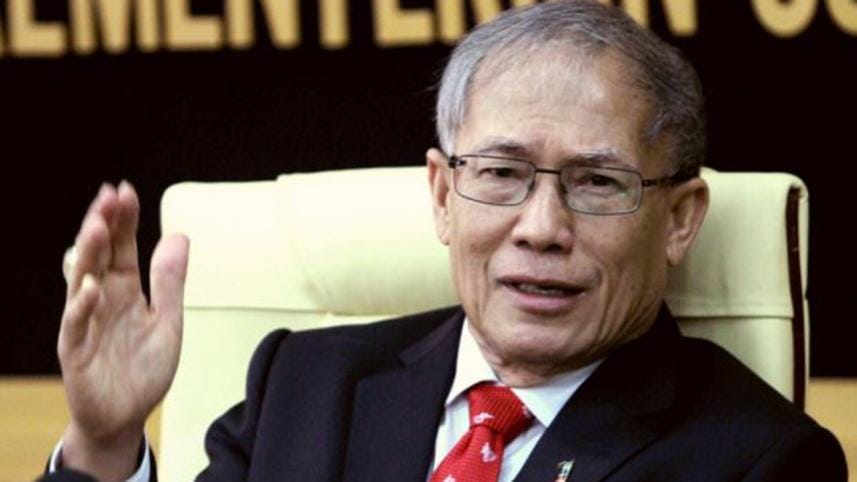Recruitment deal to stay unaffected

In yet another twist, Malaysia yesterday said the deal on labour recruitment signed with Bangladesh on Thursday would not be affected by Malaysia's decision to suspend recruitment of foreign workers.
"Further details on the decision to freeze foreign worker recruitment will be announced by the government," its Human Resources Minister Richard Riot said in a statement, reports Malaysian newspaper The Star.
Riot also welcomed his government's "positive" decision to provide employment opportunities to local people.
In another development, Malaysian immigration department has nabbed 971 “illegal expatriates”, including six Bangladeshis, in an overnight nationwide crackdown, Malaysian state-run news agency Bernama reported yesterday.
They were caught for not having identification documents, overstaying and holding unrecognised cards of the United Nations High Commission for Refugees, said Sakib Kusmi, director general of the department.
"Those detained will be placed at immigration detention depots for investigation and follow-up action," the news agency quoted Kusmi as saying.
Identities of the detained Bangladeshis could not be known immediately.
Meanwhile, Begum Shamsunnahar, acting secretary of Bangladesh expatriates' welfare ministry, said the memorandum of understanding signed between Dhaka and Kuala Lumpur remained valid as Malaysia made no official communications with Bangladesh.
“Malaysian Minister Richard Riot himself came to Dhaka to sign the deal. Neither Dhaka nor our high commission in Kuala Lumpur received any notification, written or telephonic, about suspension of the deal,” she told The Daily Star by phone.
On Friday, Malaysian Deputy Prime Minister Ahmad Zahid Hamidi said his government suspended the recruitment of all foreign workers, including those from Bangladesh, pending a review of the levy and rehiring programme.
His comment came a day after the signing of the MoU on the hiring of workers from Bangladesh.
He also told Malaysian media that the government would arrest and deport all undocumented foreign workers, who would be over 2 millions, including some 2 lakh Bangladeshis.
Asked about Hamidi's announcement, Shamsunnahar said it was Malaysia's internal matter.
Hamidi's announcement came amid an uproar from several civil and trade groups, calling on the government to legalise the undocumented migrants first, instead of hiring new foreign workers amid Malaysia's slowing economy.
The deputy PM had previously justified the government's move to bring in Bangladeshi workers, whom he said were meant to do 3D jobs (dirty, difficult and dangerous), which locals preferred not to do.
Since Malaysia's announcement in June last year to this end, Hamidi said his country would recruit 1.5 million Bangladeshi workers over the next three years.
But on Friday, he clarified that 1.5 million Bangladeshis had registered with the Ministry of Expatriates' Welfare and Overseas Employment in Bangladesh for jobs overseas, including in Malaysia.
Accordingly, the deal called G2G Plus was signed in Dhaka, allowing private recruiting agents, alongside the government, to send workers.
However, there were controversies over appointing a private Malaysian company. According to Malaysian media, companies like Bestinet and Real Time Networking lobbied Bangladesh and Malaysian governments to win the contracts to regulate the recruitment process.
Lately, a company named Synerflux was reportedly appointed by Malaysia for the job.
Bangladesh Association of International Recruiting Agencies and the Bangladesh High Commission in Kuala Lumpur opposed appointing such a company over fear of monopoly in recruitment.
But the deal went ahead anyway, although there seems to be a flip-flop going on.
Such reversal in policy is nothing new. Since the Southeast Asian country started hiring workers from Bangladesh, it froze recruitment several times, and allegations of malpractice and labour exploitation have been aplenty.
MALAYSIAN BUSINESSES REACT
In response to Hamidi's announcement, Penang Chinese Chamber of Commerce President Choot Ewe Seng said the hardest hit would be the construction, manufacturing and service sectors, which had become too dependent on foreign workers.
He said the government should consider how its latest decision would affect these industries, according to the Malaysian paper, The Star.
Ideal Property Group executive chairman Alex Ooi said the move would negatively affect the construction sector which was already facing a labour shortage.
“The move will impact severely on the progress of key infrastructure projects,” he added.
 For all latest news, follow The Daily Star's Google News channel.
For all latest news, follow The Daily Star's Google News channel.
Comments